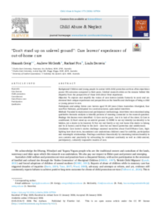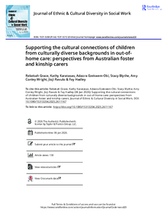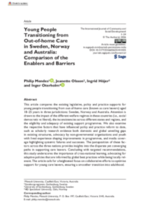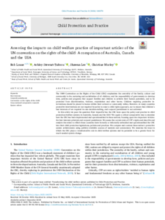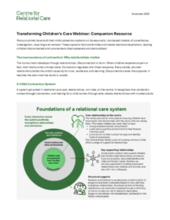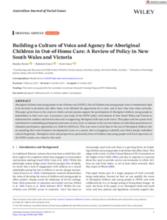

Displaying 1 - 10 of 678
The ISPCAN Melbourne 2026 Congress is the flagship international gathering of the International Society for the Prevention of Child Abuse and Neglect (ISPCAN), taking place 24–26 August 2026, with related events including pre-congress working grou
This study amplifies the voices of seven care leavers in Australia, revealing how inconsistent and conditional out-of-home care (OOHC) often undermines stability, belonging, and participation. Findings highlight six key themes—ranging from the “luck of the draw” in care quality to feeling powerless and unseen—underscoring the need for relational continuity, child-centred approaches, and culturally responsive, participatory care models.
This study examines the views of Australian foster and kinship carers on the importance of cultural connection for children from culturally diverse backgrounds, finding broad agreement that culture is central to identity and wellbeing. The findings highlight challenges in delivering cultural care and underscore the need for training in cultural humility, improved cultural data collection, and collaborative cultural care planning that includes children and birth parents as key decision-makers.
This article compares the existing legislative, policy and practice supports for young people transitioning from out-of-home care (known as care leavers) aged 18–25 years in three jurisdictions: Sweden, Norway and Australia. Attention is drawn to the impact of the different welfare regimes in these countries (i.e., social democratic vs liberal), the inconsistencies across different states and regions, and the eligibility and adequacy of existing support programmes.
The 1989 Convention on the Rights of the Child (CRC) affirms the importance of family, culture, and community in children’s lives and obligates governments to support families and protect children from discrimination, violence, and exploitation, yet many countries still lack policies that require a child-rights approach, prioritize best interests in decision-making, or prohibit corporal punishment. This article critically examines how effectively Australia, Canada, and the United States have implemented key CRC principles—particularly best interests and corporal punishment—by comparing their child protection policies, legislation, and practices to assess the Convention’s influence and its potential to drive broader system reform.
On November 13, 2025, the Transforming Children's Care Collaborative hosted a webinar to explore insights from two Australian initi
On November 12, the Transforming Children's Care Collaborative hosted a webinar to explore insights from two Australian initiatives
This paper examines how effectively out-of-home care systems in New South Wales and Victoria, Austalia support the participation of Aboriginal children and young people in decisions about their own care. It highlights systemic barriers and calls for structural reforms to embed Aboriginal child and youth voices at every level, rather than relying solely on individual practitioners to promote participation.
This article highlights New Zealand’s kinship care movement, where relatives or close family friends step in to care for children when parents are unable to.

